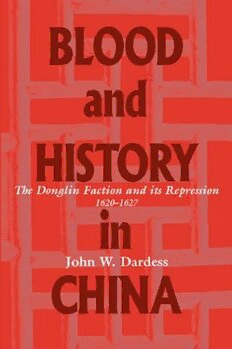
Blood and History in China: The Donglin Faction and Its Repression, 1620-1627 PDF
220 Pages·2002·1.145 MB·English
Most books are stored in the elastic cloud where traffic is expensive. For this reason, we have a limit on daily download.
Preview Blood and History in China: The Donglin Faction and Its Repression, 1620-1627
Description:
From 1625 to 1627 scholar-officials belonging to a militant Confucianist group known as the "Donglin Faction" suffered one of the most gruesome political repressions in China's history. Many were purged from key positions in the central government for their relentless push for a national moral rearmament under the Tianqi emperor. While their martyrs' deaths won them a lasting reputation for heroism and steadfastness, their opponents are remembered for fatally degrading the quality of Ming political life with their arrests and tortures of Donglin partisans. John Dardess employs a wide range of little-used primary sources (letters, diaries, eyewitness accounts, memorials, imperial edicts) to provide a remarkably detailed narrative of the inner workings of Ming government and of this dramatic period as a whole. Comparing the repression with the Tiananmen demonstrations of 1989, he argues that Tiananmen offers compelling clues to a rereading of the events of the 1620s. Leaders of both movements were less interested in practical reform than in communicating sincere moral feelings to rulers and the public. In the end the protesters succeeded in commemorating their dead and imprisoned and in disgracing those responsible for the violence. A work of unprecedented depth skillfully told, Blood and History in China will be appreciated by specialists in intellectual history and Ming and early Qing studies.
See more
The list of books you might like
Most books are stored in the elastic cloud where traffic is expensive. For this reason, we have a limit on daily download.
